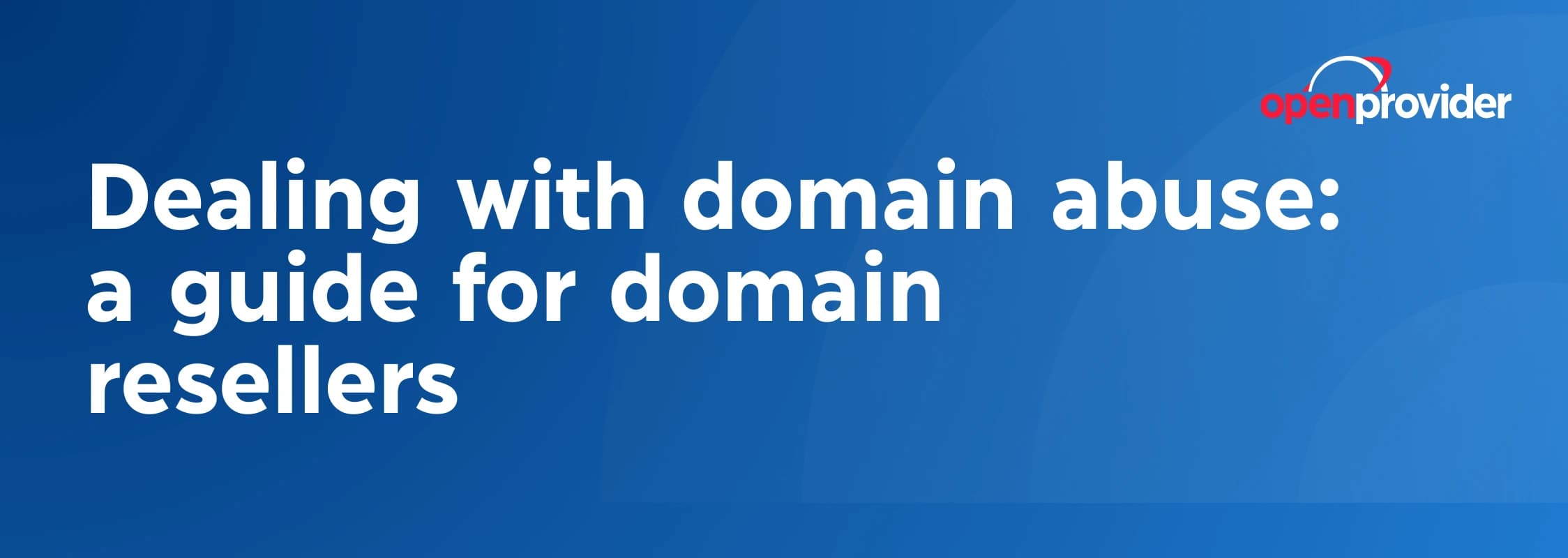Dealing with domain abuse: a guide for domain resellers
0 MIN READ TIME

Domain abuse is an increasingly prevalent issue that impacts not only businesses and individuals but the integrity of the Internet as a whole. As a reseller, you are a prime target for those seeking to carry out domain abuse. In April and May 2024 alone, ICANN received 1,558 complaints related to DNS abuse and other types of abuse, but many cases also fly under the radar.
As a domain reseller, you play a crucial role in combating domain abuse and ensuring the security of the domains you provide to your customers. In this article, we’ll explore what domain abuse is, the types of abuse you may encounter as a reseller, and actionable steps to help you identify and mitigate abuse cases in an effective way.
What is domain abuse?
Domain abuse refers to the malicious use of a domain for unlawful purposes, often involving fraud, spam, or harmful content. These abusive practices can damage reputations, harm end-users, and degrade trust in online platforms.
These are the most common types of domain abuse:
- Phishing: Domain names that support web pages that masquerade as a trustworthy entity. These could include entities like banks, known brands, e-commerce, or government agencies.
- Malware: Domain names that facilitate hosting and/or spreading hostile or intrusive software that is installed on end systems, potentially without the consent of the end-user.
- Botnet command-and-control: Domain names used to identify hosts that control botnets and collections of malware-infected computers. These can be used to perpetrate different abusive activities, such as spam emails or phishing campaigns.
- Spam: Domains that are advertised in unsolicited bulk email or used to name spam mail exchange systems.
- Trademark infringement: Bad actors may use domains to infringe on well-known trademarks or engage in cybersquatting, registering domains that closely resemble established brands in an attempt to mislead users.
- Illegal content: Domains that are used to host illegal content, such as counterfeit goods, illegal streaming sites, or explicit material prohibited by law.
What domain abuse means for resellers
Domain abuse poses a significant risk to resellers like hosting providers and marketing agencies. A history of abuse cases can tarnish your brand’s reputation, lead to legal liabilities, and even result in financial loss. As a reseller, you are seen as a custodian of the domains you sell, and customers expect you to maintain a safe environment. Addressing domain abuse proactively can help build trust with your clients and set you apart as a responsible and reputable reseller.
Best practices for dealing with domain abuse as a reseller
The following are key ways for you, as a domain reseller, to protect your domains from abuse.
1. Establish clear policies
Define your stance on domain abuse clearly in your terms of service and fair use policy. Outline the types of activities considered abusive and make sure your customers are aware that their domains could be suspended or terminated if they engage in these practices.
2. Monitor domains actively
Use monitoring tools and services to detect unusual or suspicious activity. Services like DNS filtering, Whois monitoring, and real-time scanning for phishing sites can help you stay on top of any potential abuse associated with your customers’ domains so you can intervene quickly if a suspicious situation arises.
We also recommend setting up automated alerts for sudden changes in domain traffic patterns or other activities that might indicate abuse. These alerts allow you to take swift action on suspicious domains and prevent potential abuse from escalating.
3. Respond to abuse reports promptly
If you receive an abuse report, act quickly to verify the claim. If you are a hosting provider, and the abuse complaint is about website content that is hosted by you, you are responsible for dealing with this case and taking down the website if needed.
Meanwhile, abuse complaints about misused domain names (such as domains used for phishing attacks) are handled at the registrar level. In these cases, it is important to contact your registrar partner as soon as you can to determine the appropriate action, which might include suspending or taking down the domain.
Acting promptly can minimize the impact of abuse and shows your commitment to protecting the online community.
4. Minimize risk through prevention
Prevention is better than cure. To minimize the risk of domain abuse, it is wise to continuously educate your customers on best practices for domain security around areas such as:
- Enabling DNSSEC.
- Using two-factor authentication.
- Using a paid SSL certificate over a free one.
- Implementing DMARC.
- Setting up Whois Privacy Protection, if applicable.
Customers with trademarked domains may also benefit from domain blocking services, which you can resell through Openprovider.
Remember that prevention does not end with informing your customers. Make sure to stay informed of the trends in cybersecurity by following the latest news about this topic and engaging in industry forums and communities about cybercrime. Openprovider regularly shares resources about this topic, which you are free to share with your customers as well.
Conclusion
As a domain reseller, you have a unique role in the fight against domain abuse. By establishing strong policies, actively monitoring domains, responding promptly to abuse reports, and educating your customers, you can help reduce domain abuse and contribute to a safer online environment. Your efforts not only protect your customers but also enhance the credibility of your business, fostering trust and loyalty among your clients.
Domain abuse is an ongoing challenge, but with vigilance and proactive measures, resellers can make a significant difference. Remember, safeguarding the integrity of the internet is a collective responsibility, and as a reseller, you can make a tangible difference.

